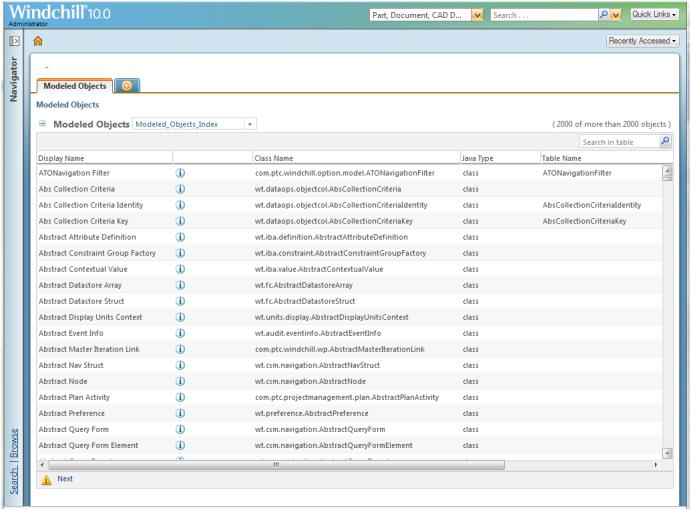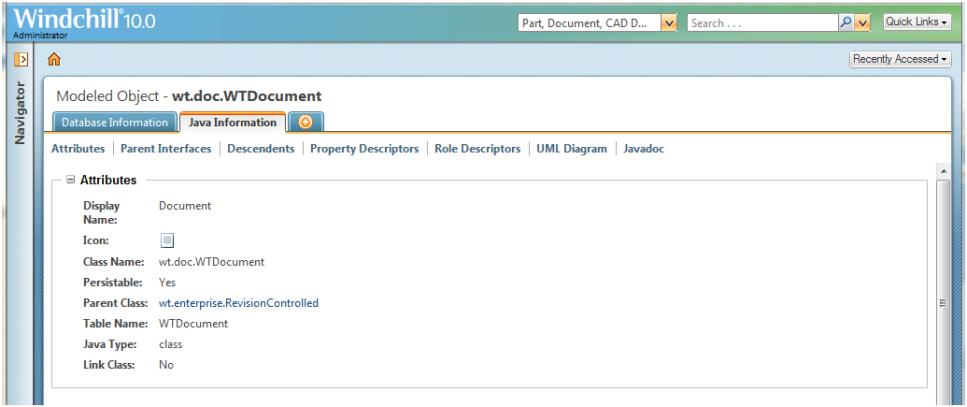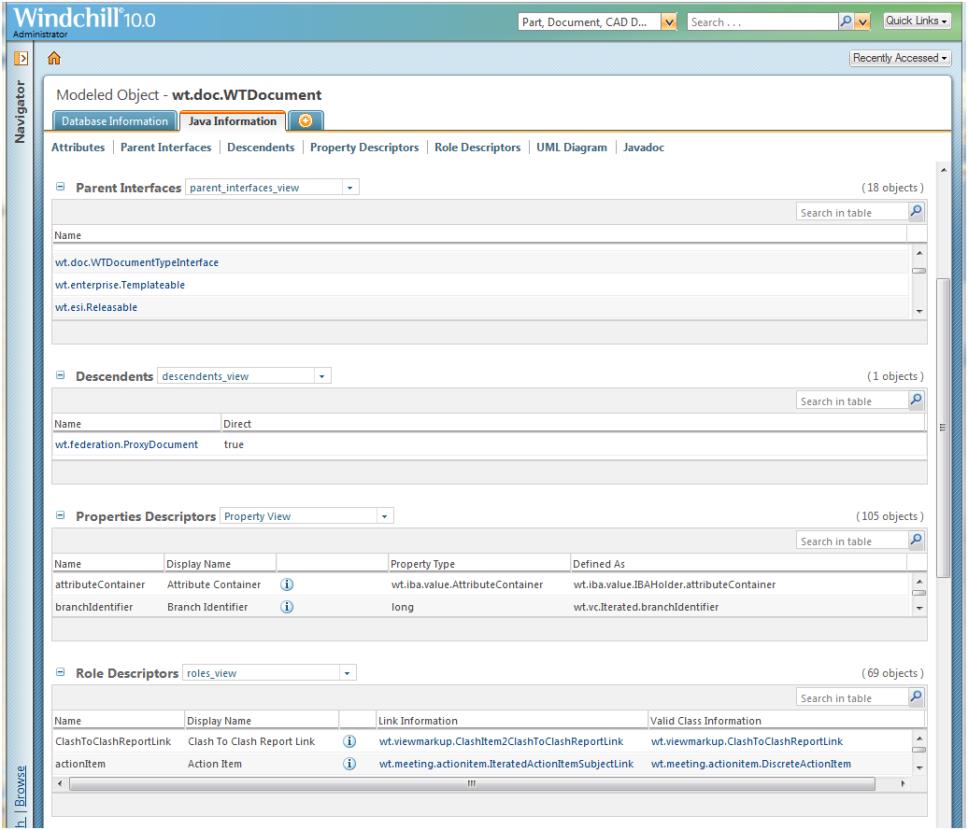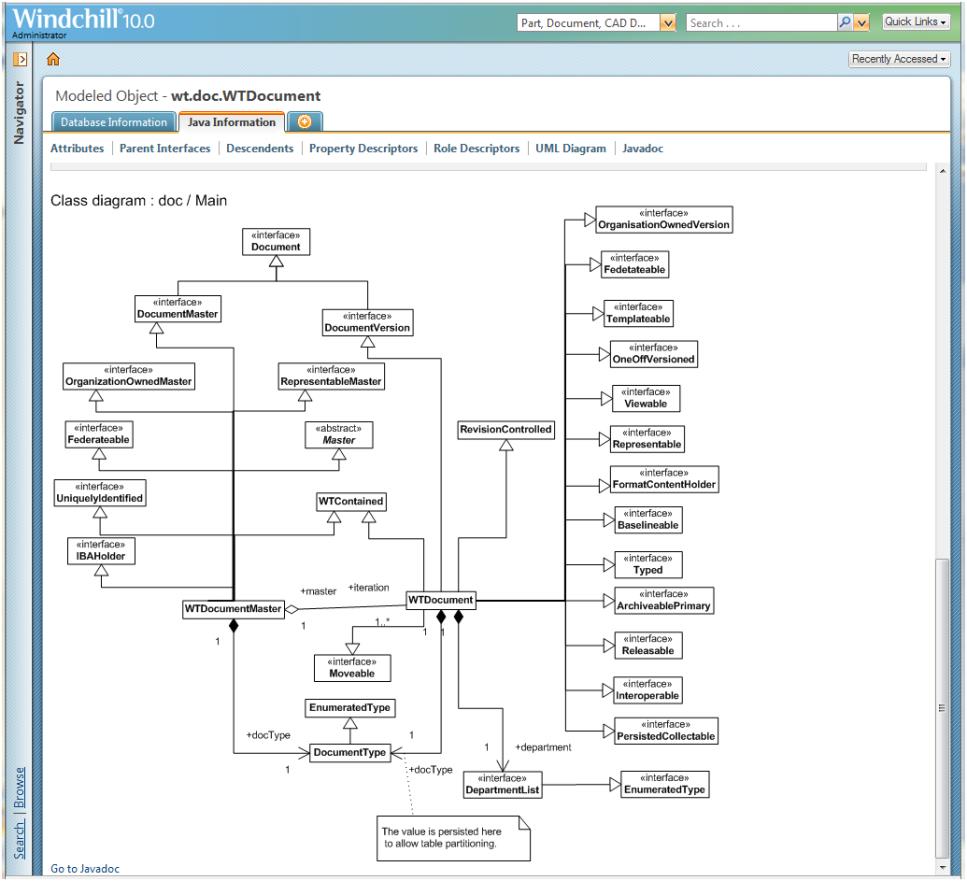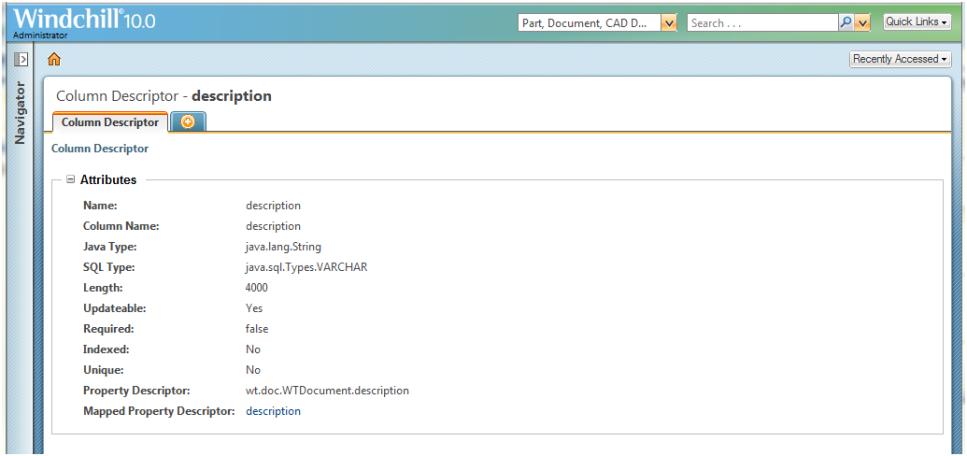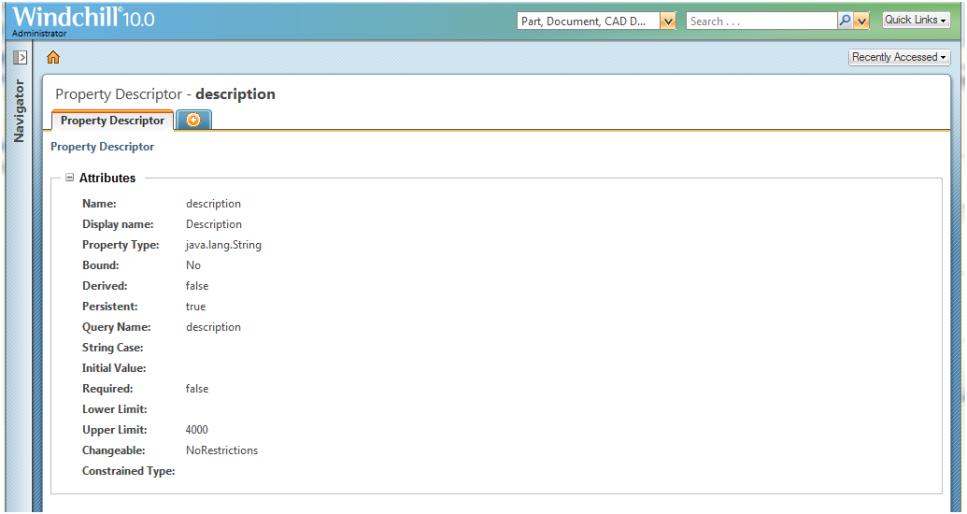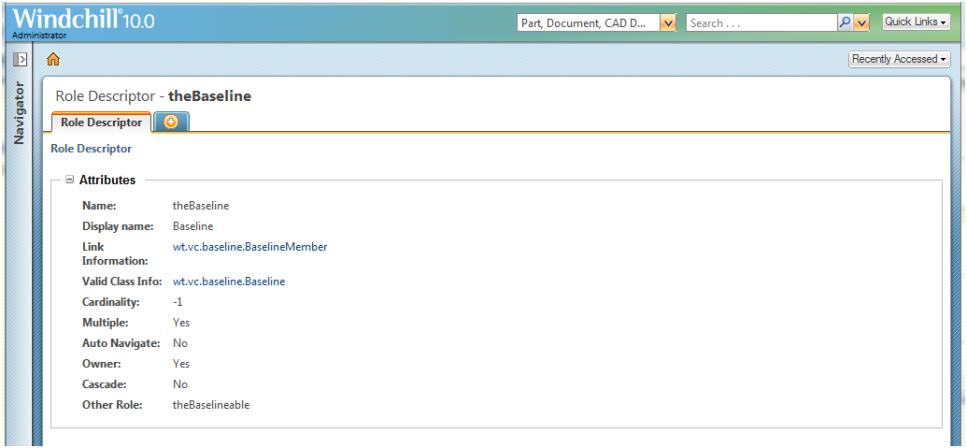Modeled Objects
Windchill manages many types of business and administrative concepts. The concepts are modeled as objects in Java and instances of those objects are stored in a database. The Modeled Objects page provides information about all modeled objects on the current system. It provides a report that lists all of the modeled objects, and then a link to a details page for each one.
The detailed information pages can include information about the meta data for the object, the persistence mapping between the Java object and a database table, UML diagrams and links to Javadoc.
Use these pages to learn about the modeled objects, how they are related, and how they are stored in the database.
Location: > > > >
Support
• The report, and corresponding detail pages, are generated dynamically for all modeled objects installed on the current system, whether they are exposed to end users or not. This includes custom modeled objects created by customers.
Modeled Objects
• The Modeled_Objects_Index view of Modeled Objects shows a table of all the modeled objects in the current Windchill system.
Columns:
• Display Name: The name of the object as it is exposed to end users.
• "Link to Detailed Information Page": A link to detailed information page for the object.
• Class Name: The fully qualified Java class name for the object.
• Java Type: "class" or "interface".
• Table Name: If there is a corresponding database table name for the object, then it is listed here. Not all modeled objects correspond directly to a database table.
• Detailed Information Page: The detailed information page for each object has two tabs, one for the Database Information and one for the Java Information. Only objects that have a corresponding database table will have a Database Information tab.
• Database Information: The Database Information tab has four sections of information about the object's database table.
• Table Attributes: A list of single valued attributes that describe the database table. At the moment, the only value is the Table Name.
Column Descriptors
A table of Column Descriptors. There is one row for each column in the database table. Within the Windchill meta data, this information is stored in a "Column Descriptor" class, thus the name "Column Descriptor".
Column | Description |
Name | The generated name of the column descriptor. |
"Link to Detailed Information Page" | A link to detailed information page for the object. |
Column Name | The database column name |
SQL Type | The type of the database column |
Length | The length of the database column (or 0 if none) |
Mapped Property Descriptor | Each column is mapped from a Property Descriptor. This a link to an information page about that Property Descriptor. |
Composite Unique Indices
A table of composite unique indices on the database table. Each row shows the index number and the list of columns included in the index.
Java Information
The Java Information tab has seven sections of information about the object's Java class.
Attributes
A list of single valued attributes that describe the class.
Attribute | Description |
Display Name | The name of the object as it is exposed to end users. |
Icon | An image of the icon used to represent instances of this object in the Windchill UI |
Class Name | The fully qualified Java class name |
Persistable | "Yes" or "No". Only concrete, persistable classes will have a corresponding database table. |
Parent Class | The direct, Java, parent class. This will be a link to that class's information page (if the page exists). |
Table Name | The corresponding database table name (if any) Java Type "class" or "interface" |
Link Class | "Yes" or "No" depending on if this is a Link Class. |
• Parent Interfaces: A table of the names of the modeled interfaces implemented directly by this class.
• Descendents: A table of the modeled descendant classes of this class.
• Property Descriptors: A table of Property Descriptors. Within the Windchill meta data, this information is stored in a "Property Descriptor" class, thus the name "Property Descriptor".
Columns
◦ Name: The name of the property descriptor.
◦ Display Name: The name of the property as it is exposed to end users.
◦ "Link to Detailed Information Page": A link to detailed information page for the property descriptor.
◦ Property Type: The Java type of the property.
◦ Defined As: The fully qualified internal name of this property.
• Role Descriptors: A table of Role Descriptors. Within the Windchill meta data, this information is stored in a "Role Descriptor" class, thus the name "Property Descriptor". An association in Windchill is between two classes. Each of the two classes plays a "role" with respect to that association and this is what is represented by a Role Descriptor.
Columns
◦ Name: The name of the property descriptor.
◦ Display Name: The name of the Role or Association as it is exposed to end users.
◦ "Link to Detailed Information Page": A link to detailed information page for the role descriptor.
◦ Link Information: A link to the Information Page for the link class corresponding to this role.
◦ Valid Class Information: A link to the Information Page for the class that plays the other side role on the corresponding link class.
• UML Diagram: A UML diagram for the class (not all classes have UML diagrams).
• Javadoc: A link to the Javadoc for this class. Will only appear if the class itself is included in the Windchill Supported API.
Column Descriptor Information Page: The Information Page for a Column Descriptor shows a panel of single valued attributes of the column
• Name - The name of the column descriptor
• Column Name - The name of the corresponding table column
• Java Type - The type of the value represented in Java
• SQL Type - The type of the value represent in the database
• Length - The maximum length of a string column.
• Updateable - "Yes" or "No" -- Always "Yes"
• Required - The column is required to be set by the Windchill method server.
• Indexed - "Yes" or "No" depending if the column was designated to be indexed in the model
• Unique - "Yes" or "No" depending if the model specified that the corresponding value should be unique across all instances
• Property Descriptor - The fully qualified name of the Property Descriptor that maps to this Column Descriptor
• Mapped Property Descriptor - A link to the corresponding property descriptor
• Property Descriptor Information Page: The Information Page for a Property Descriptor shows a panel of single valued attributes of the property:
◦ Name -- The internal name of the property
◦ Display name -- The name of the property as it is exposed to end users.
◦ Property Type -- The Java type or they property
◦ Bound -- (not used)
◦ Derived -- "true" or "false" depending on if this property was modeled as a derived attribute or not.
◦ Persistent -- "true" or "false" depending on if this property is persistent or transient
◦ Query Name -- The name used to represent this property in programmatic queries.
◦ String Case -- Mixed, Upper or Lower. Default is Mixed.
◦ Initial Value -- The modeled, initial value -- if any.
◦ Required -- "true" or "false" depending on if this property is required in order to create a new instance of the corresponding object.
◦ Lower Limit -- For a string, the minimum number of characters. For numbers, the minimum value.
◦ Upper Limit -- For a string, the maximum number of characters. For numbers, the maximum value.
◦ Changeable -- One of "Default", "Frozen" or "Via Other Means". (See the Javadoc for com.ptc.windchill.annotations.metadata.Changeable)
◦ Constrained Type -- (not used)
• Role Descriptor Information Page: The Information Page for a Role Descriptor shows a panel of single valued attributes of the role.
◦ Name -- The internal name of the property
◦ Display name -- The name of the property as it is exposed to end users.
◦ Link Information -- A link to the modeled link object
◦ Valid Class Info -- A link to the modeled class that is the type of this role.
◦ Cardinality -- (not used)
◦ Multiple -- (not used)
◦ Auto Navigate -- "Yes" or "No". (see the Javadoc for com.ptc.windchill.annotations.metadata.ForeignKeyRole autoNavigate element)
◦ Owner -- "Yes" or "No" (see the Javadoc for com.ptc.windchill.annotations.metadata.GeneratedRole owner element)
◦ Cascade -- "Yes" or "No" (see the Javadoc for com.ptc.windchill.annotations.metadata.GeneratedRole cascade element)
◦ Other Role -- The name of the other side role descriptor
Parent topic
